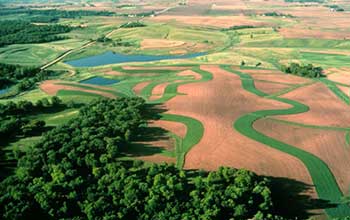NSF awards more than $18 million to better comprehend links between environmental, human aspects of ecosystems

NSF’s CNH2 awards will enable scientists to investigate environmental and human links in ecosystems.
Credit: USDA
The social and environmental costs of wildfires have grown dramatically in recent decades, and more information is needed to understand how communities can better organize in the face of this growing hazard, scientists have found.
Now, researchers funded by the National Science Foundation's Dynamics of Integrated Socio-Environmental Systems (CNH2) program are exploring the potential for adaptive social networks in fire-prone regions to improve communities' ability to cope with increasingly large and intense wildfires.
The grant is one of 16 awards totaling $18.3 million made this year through the program.
CNH2 supports research that advances a basic scientific understanding of integrated socio-environmental systems and the complex interactions within and among the environmental and human components of these systems.
"If we are going to understand, forecast and manage the changes affecting Earth, it will require new approaches that study how human and environmental systems function as one complex, connected and fully integrated system," says Elizabeth Blood, lead NSF program director for this year’s CNH2 awards.
The awards are supported by three NSF directorates: Biological Sciences; Geosciences; and Social, Behavioral, and Economic Sciences. CNH2 projects explore a connected and integrated socio-environmental system, including analyses of the processes that take place between environmental and human components. The new grants emphasize the integrated nature of a socio-environmental system rather than two discrete systems -- a natural one and a human one -- that are coupled.
Other new CNH2 projects investigate the links between urban food security and rural agricultural production. The research will evaluate the effect of environmental variability on rural agricultural production and how it impacts urban food security and, in turn, how urban population growth affects the demand for local and regional agricultural production.
CNH2 projects address a number of subjects:
- Effective strategies for managing invasive species.
- Integrated urban water systems.
- Urban trees as living infrastructure.
- Ticks and Lyme disease in human-dominated landscapes.
- The relationship between inshore marine ecosystems and small-scale fishing activities.
A list of the NSF 2019 CNH2 projects and their lead investigators and affiliations is below.
CNH2-L: Solving Grand Challenges in Coupled Natural Human Systems: Predicting Effective Governance Strategies for Managing Invasive Species, Elizabeth Baldwin, University of Arizona
CNH2-L: Transition Dynamics in Integrated Urban Water Systems, Margaret Garcia, Arizona State University
CNH2-S: Long Term Perspectives on Water Security, Food Security, and Land Management Among Pastoralists Experiencing Change, Matthew Douglass, University of Nebraska-Lincoln
CNH2-L: Toward a Theory of Urban Trees as Living Infrastructure, George Jenerette, University of California, Riverside
CNH2-L: Social and ecological determinants of multi-host vector-borne infections in dynamic tropical landscapes, John Drake, University of Georgia Research Foundation
CNH2-L: Climate Change and the Coupled Dynamics of Tropical Forest Ecology and Human Food Production, Robert Rosenswig, SUNY at Albany
CNH2-L: Uncovering Metacoupled Socio-Environmental Systems, Jianguo Liu, Michigan State University
CNH2-L: Linkages and Interactions Between Urban Food Security and Rural Agricultural Systems, Tom Evans, University of Arizona
CNH2-L: Developing adaptive capacity in wildfire-prone regions, Bart Johnson, University of Oregon Eugene
CNH2-S: Understanding the Coupling Between Climate Policy and Ecosystem Change, Frances Moore, University of California, Davis
CNH2-S: Mercury Pollution and Human-Technical-Environmental Interactions in Artisanal Mining, Noelle Selin, Massachusetts Institute of Technology
CNH2-S: Sustainable field-to-market supply chains enabled by blockchain networks, Mark Wright, Iowa State University
CNH2-L: Eco-social interactions influencing human exposure to ticks and the Lyme disease agent in anthropogenic landscapes, Maria Diuk-Wasser, Columbia University
CNH2-L: Social, Ecological, and Institutional Dynamics of Human-Wildlife Relations, Anne Short Gianotti, Trustees of Boston University
CNH2: Socio-Ecological Feedbacks of Marine Protected Areas: Dynamics of Small-Scale Fishing Communities and Inshore Marine Ecosystems, Merrill Baker-Medard, Middlebury College
CNH2-S: Impacts of Urban Rats and Rodent Control on Public Health and Urban Wildlife Conservation, Maureen Murray, Lincoln Park Zoo
Media Contacts
Media Affairs, NSF, (703) 292-7090, media@nsf.gov


